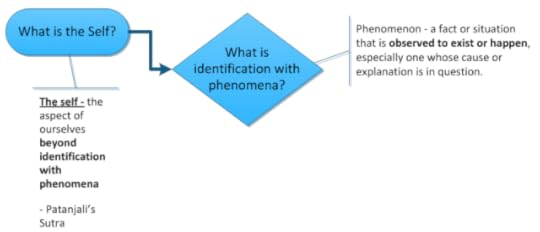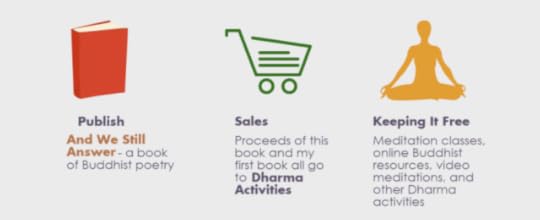Andrew Furst's Blog, page 105
September 28, 2015
Who Are You? – Dialectic Two Step
Estimated reading time: 15 minute(s)
Who Are You?
Who are you? It’s a perfectly reasonable question. You’d expect a straightforward answer. On the surface its abundantly clear. In a single gesture the answer is apparent. You point to yourself and the conversation is over. But, ask a philosopher or a priest, and suddenly, things get complicated. The Buddha even contributed to the morass. So what’s all the fuss?
Dualism is a complicated, roundly rejected philosophical idea. It is also one of the most entrenched ideas in the world. Its a compelling fiction about who we are. It’s the idea that we are composed of two types of stuff: matter and mind stuff. The matter part is uncontroversial. It’s the mind stuff that gets messy. When it comes to mind, its not a stretch to think that ideas, volition, intention and so on don’t fit into the category of matter. When we dig into the question of who we are, people are perfectly content to speak of the soul or the ineffable self.
Let’s start digging to see what I mean. I’m going to look at this from an eastern perspective. First because it gives us a little distance from ideas that many westerners get defensive about, and because the definitions tend to be generically clear. Follow this flow chart.
The first step is establishing the dualism itself. In Patanjali’s Yoga Sutra, there is a very good working definition of the self. It is not matter, or not observable in the way matter is.
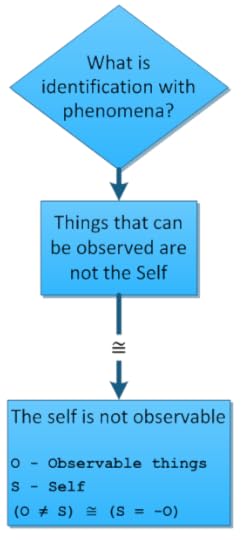
Now we have stepped into the world of mysticism – belief that spiritual apprehension of knowledge inaccessible to the intellect, may be attained through contemplation. I want to establish some boundaries on what we can and can’t talk about in the world of mysticism. Language is the medium for conceptualizing the experience of phenomenon. Self, by this definition, is not phenomenon. So we can’t talk about it, or to be more precise, we can’t use it as a premise or conclusion in a logical argument.
Self, as defined by the Sutra, is an empty concept. It is a place holder for something without definition. This is very important, because mysticism can be a curtain. People will produce all kinds of nonsense from behind it. As soon as you apply an attribute (color, dimensions, or other quality) to something mystical, you are breaking the rules. Something that is other than phenomenon, is by definition free from observable attributes. For example, you can’t claim that the soul carries your personality. Your personality is distinctly observable.
So in the language of logic, we have two ways of producing conclusions about something. Deduction and induction. Both take as premises, verifiable phenomenon. For instance take the following deductive argument:
ArgumentPremise P1: All cats have tails
Premise P2: Stella is a cat
Conclusion: Stella has a tail
Two things give us confidence in the veracity of the conclusion.
That the structure of the logical argument is valid
That the premises are verifiably true.
Take another deductive argument:
ArgumentPremise P1: All Trolls smell bad
Premise P2: Stella is a troll
Conclusion: Stella smells bad
In this case the logical argument is valid (it’s the same argument as above), but the premises can’t be verified, because there are no trolls in the world we live in.
Induction works similarly. Induction relies on patterns of premises. Take the most common inductive argument.
ArgumentPremise P2: Everyday of my life the sun has risen in the east
Conclusion: The sun will rise in the east tomorrow
If the premise is verifiably true, we have a high degree of confidence in the conclusion. At the very least least we would say if the conclusion were wrong, that something unusual intervened to change the suns behavior. When something is unverifiable (i.e. beyond identification with phenomenon), the truth of it will forever be unknown. For all intents and purposes the concept is without any value to us. It’s a dead end.
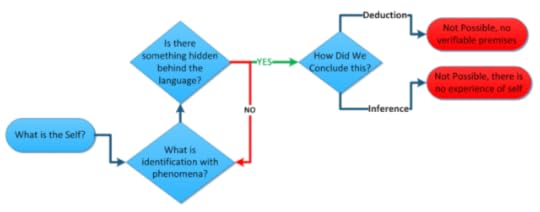
So all this raises the question: Why talk about the self, or the soul at all? What purpose would we have?
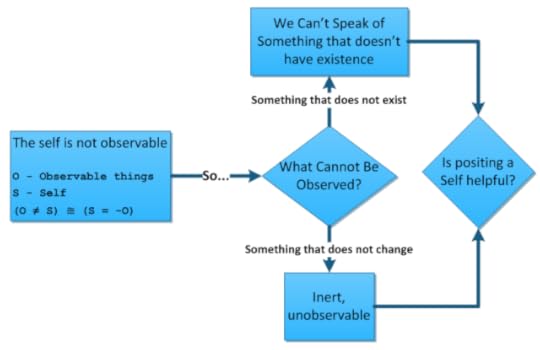
A few thoughts I had were as follows. But they all reach a dead end.
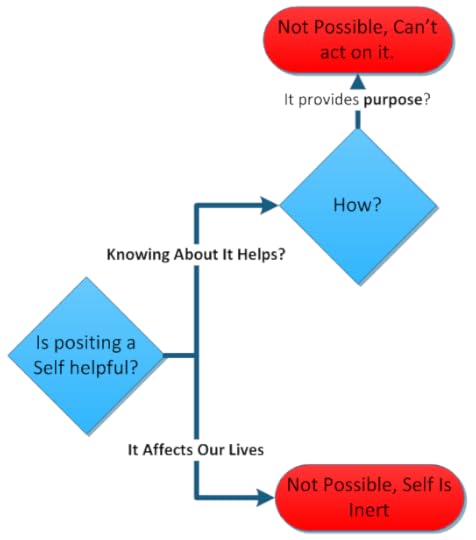
Unfortunately we’re left with an unsatisfactory feeling in our guts. Most of us find the concept of self useful, even if we don’t have a totally clear sense of the details. What gives?
Here’s where the Buddha* saved the day. He asked the question, is the self really separate from phenomenon? Granted there are some puzzles around a phenomenal self; for instances which phenomenon are us and which are not? And, If you were to remove some qualities of the phenomenal self – e.g. hair, a limb, or a personality trait – would we no longer be our selves? But the answer seems to be intuitively yes. If the self is phenomenal, then it is subject to change. Self changes. Self is impermanent.
The Buddha seems to have rejected dualism or at least he chose not to mix mind stuff into logical arguments about the way things are. Puzzles still remain. The Buddha’s way is bound by experience and avoids conjecture about what might lie beyond the veil of mystery.
*NOTE: The Buddha preceded Patanjali’s Sutra (the Sutra is considered by some to be Hinduism’s response to the Buddha)
Dialectic Two-Step is an ongoing series of my thoughts on questions that come my way.
Wisdom lies neither in fixity nor in change, but in the dialectic between the two. - Octavio
Get Each Week's Dialectic Two Step in your email box
First Name:
Last Name:
Email address:
In addition to a monthly email you can also subscribe to the following weekly series:
One Minute Meditations
Tiny Drops (Photography series)
Compass Songs (My Favorite Poems)
Dialectic Two-Step
Modern Koans (interesting questions)
Sunday Morning Coming Down (Music Videos)
Relics (Timeless Republished Articles)
Say What?
Quotes
Verse Us (Poems I Write)
The post Who Are You? – Dialectic Two Step appeared on Andrew Furst.
September 27, 2015
Fluidity – A Five Minute Meditation
The detail of the world is obscured by our heterophenomenology*, that is our beliefs about the world which are independent of the truth about the world. To me mental illness is a great teacher in this regard. Experiencing the symptoms of depression tell me that my story about myself, my view of the world, is not entirely related to my actual state of wellness or disease. The symptoms appear unrelated to my perceived moods, stressors, or antecedents. There seems to be a failure in cause and effect if I take my belief that I am in a healthy state as the truth.
Here is where great doubt is valuable. As Dennett and his colleagues in the cognitive sciences are uncovering. Our personal expertise in consciousness it mostly faulty. Our brains are frequently projecting magic into our experience of consciousness.
These video clips which I borrowed from Discovery Showcase: Invisible Worlds In the Water show how our beliefs about how water dripping into a water bath are false when seen slowed down using video shot at 10000 frames a second. The video is beautiful and a good example of how our beliefs are often wrong about the detail of our world.
Meditation: Accepting the world as it is, is no small feat. It is not quite letting go. There is a certain effort one must exert to free your mind of its delusions. What does that effort feel like? Does knowing the truth have any bearing on accepting the world as it is?
*Daniel C. Dennett – Consciousness Explained
Enjoy These Meditation Videos In Full Screen
One Minute Meditations is an ongoing series of short videos, poems, and commentary intended as a meditation. Offered as an opportunity to step back from your cyber routine and settle into a more natural rhythm, if only for a minute.
Get Each Week's One Minute Meditation in your email box
First Name:
Last Name:
Email address:
In addition to a monthly email you can also subscribe to the following weekly series:
One Minute Meditations
Tiny Drops (Photography series)
Compass Songs (My Favorite Poems)
Dialectic Two-Step
Modern Koans (interesting questions)
Sunday Morning Coming Down (Music Videos)
Relics (Timeless Republished Articles)
Say What?
Quotes
Verse Us (Poems I Write)
These videos are produced for those of us who spend an inordinately large amount of time in the cyber-world. They are not a substitute for unplugging from your devices and taking a stroll near trees, water, or a patch of unkempt grass. Getting out into the world - touching, smelling, hearing, and seeing nature is the best way to reconnect with our prime purpose.
What is our prime purpose? We are feeling and sensing machines. We are the universe looking back on itself. We are witness to the wonders and dangers of living in this corner of the cosmos. We are the seekers looking for connection a little further beyond yesterday's borders and boundaries.
But sitting and staring at the screen robs us of the sustenance that we rely upon for wonder and sanity. These videos are an opportunity to bring the sensations of nature to you, while you're in the cyber-world. Its an opportunity to relax your gaze, resettle your posture, and regain some depth in your breath. Listen and watch the video and allow your self to open up and recharge.
The post Fluidity – A Five Minute Meditation appeared on Andrew Furst.
500 miles – Peter, Paul and Mary – Sunday Morning Coming Down
This is part of my eldest sons set a Philmont Scout Camp in New Mexico (He’s a music program counselor)
Sunday Morning Coming Down is an ongoing music video series. The songs fit my definition of music for a lazy couch bound Sunday morning. Get Each Week's Sunday Morning Coming Down in your email box
First Name:
Last Name:
Email address:
In addition to a monthly email you can also subscribe to the following weekly series:
One Minute Meditations
Tiny Drops (Photography series)
Compass Songs (My Favorite Poems)
Dialectic Two-Step
Modern Koans (interesting questions)
Sunday Morning Coming Down (Music Videos)
Relics (Timeless Republished Articles)
Say What?
Quotes
Verse Us (Poems I Write)
500 miles
by Peter, Paul and Mary
If you miss the train I’m on, you will know that I am gone
You can hear the whistle blow a hundred miles
A Hundred miles, a hundred miles, a hundred miles, a hundred miles
You can hear the whistle blow a hundred miles
Lord I’m one, Lord I’m two, Lord I’m three, Lord I’m four
Lord I’m 500 miles away from home
away from home, away from home, away from home, away from home
Lord I’m 500 miles away from home
Not a shirt on my back, not a penny to my name
Lord I can’t go a-home this a-way
This a-away, this a-way, this a-way, this a-way
Lord I can’t go a-home this a-way
If you miss the train I’m on, you will know that I am gone
You can hear the whistle blow a hundred miles
The post 500 miles – Peter, Paul and Mary – Sunday Morning Coming Down appeared on Andrew Furst.
September 26, 2015
Choosing Your Religion? – Say What?

Say What? is an ongoing series of laconic exchanges on Buddhism in the format of a comic strip.
Get Each Week's Say What? Comic in your email box
First Name:
Last Name:
Email address:
In addition to a monthly email you can also subscribe to the following weekly series:
One Minute Meditations
Tiny Drops (Photography series)
Compass Songs (My Favorite Poems)
Dialectic Two-Step
Modern Koans (interesting questions)
Sunday Morning Coming Down (Music Videos)
Relics (Timeless Republished Articles)
Say What?
Quotes
Verse Us (Poems I Write)
The post Choosing Your Religion? – Say What? appeared on Andrew Furst.
Black & White VIII – Tiny Drops (Photography)
 Get Each Week's Tiny Drops in your email box
Get Each Week's Tiny Drops in your email box
First Name:
Last Name:
Email address:
In addition to a monthly email you can also subscribe to the following weekly series:
One Minute Meditations
Tiny Drops (Photography series)
Compass Songs (My Favorite Poems)
Dialectic Two-Step
Modern Koans (interesting questions)
Sunday Morning Coming Down (Music Videos)
Relics (Timeless Republished Articles)
Say What?
Quotes
Verse Us (Poems I Write)
Black & White VIII
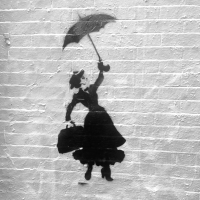 mary poppins bw
mary poppins bw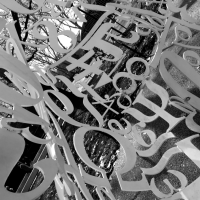 sculpture bw
sculpture bw tinker bw
tinker bwMunicipal Artifacts
Get Each Week's Tiny Drops in your email box
First Name:
Last Name:
Email address:
In addition to a monthly email you can also subscribe to the following weekly series:
One Minute Meditations
Tiny Drops (Photography series)
Compass Songs (My Favorite Poems)
Dialectic Two-Step
Modern Koans (interesting questions)
Sunday Morning Coming Down (Music Videos)
Relics (Timeless Republished Articles)
Say What?
Quotes
Verse Us (Poems I Write)
FIVE LIMITLESS THOUGHTS
May all living beings have happiness and its causes
May all be free from unhappiness and its causes
May all dwell in equanimity, free of attraction and aversion
May all quickly find the great happiness that lies beyond all misery
May all enjoy inner and outer peace now and forever
NAMO AMITOFO
The post Black & White VIII – Tiny Drops (Photography) appeared on Andrew Furst.
September 25, 2015
Round 2: Help Me Choose A Cover For My Next Book
Okay, thank you for the great response to the book cover poll. There was a clear winner along with some suggestions that we should move towards more color. So I’m going to put the winner of round 1 head to head with an all color version.
Please take a look at the two options and tell me which one you like best. Making these choices is always so hard. Hearing from you will be a big help.
Note: There is a poll embedded within this post, please visit the site to participate in this post's poll.
Learn More About The Upcoming Book
Click here to read what the book is about and how to help get it published
The post Round 2: Help Me Choose A Cover For My Next Book appeared on Andrew Furst.
Injury To Others
The post Injury To Others appeared on Andrew Furst.
Are Buddhists Idol Worshipers? – Modern Koans
Estimated reading time: 3 minute(s)
Are Buddhists Idol Worshipers?
Why do Buddhists worship idols when Buddha himself was against idol worship?
Because of the ego’s need to secure itself. One of the simplest ways to palliate the ego is to project another, ideally in the form of a parental figure or Godhead, who will care for us.
This is a pitfall of theistic religion. Buddhism, while technically a non-theist religion, certainly seems to offer a plethora of potential idols.
While a teacher will tell you that these images and icons are not idols, most Buddhists will fall into the trap, if not at least for a portion of their practice. Some will never break the spell.
What’s your view of the icons, statues, deity visualization, and so on that comes with some Buddhist practices. Are our understandings related to the stages of practice? What is the result of our misunderstanding? Is there harm in using such elaborate and deity centric language and practices in Buddhism?
I’d love to hear your thoughts in the comments below.
Modern Koans is an ongoing series that recognizes that good questions are often more important then their answers.
The riddles of God are more satisfying than the solutions of man. ― G.K. Chesterton Get Each Week's Modern Koan in your email box
First Name:
Last Name:
Email address:
In addition to a monthly email you can also subscribe to the following weekly series:
One Minute Meditations
Tiny Drops (Photography series)
Compass Songs (My Favorite Poems)
Dialectic Two-Step
Modern Koans (interesting questions)
Sunday Morning Coming Down (Music Videos)
Relics (Timeless Republished Articles)
Say What?
Quotes
Verse Us (Poems I Write)
The post Are Buddhists Idol Worshipers? – Modern Koans appeared on Andrew Furst.
September 24, 2015
Help Me Choose A Cover For My Next Book
I’m reviewing some great options that Garrett Brown at GB Creative has generated for the cover of my new book, recently re-titled Clouds Tell Us. I wanted to get your opinion on which one to choose.
Please take a look at the four options and tell me which one you like best. Making these choices is always so hard. Hearing from you will be a big help.
Note: There is a poll embedded within this post, please visit the site to participate in this post's poll.
Learn More About The Upcoming Book
Click here to read what the book is about and how to help get it published
The post Help Me Choose A Cover For My Next Book appeared on Andrew Furst.
William James on Attitude
The post William James on Attitude appeared on Andrew Furst.

